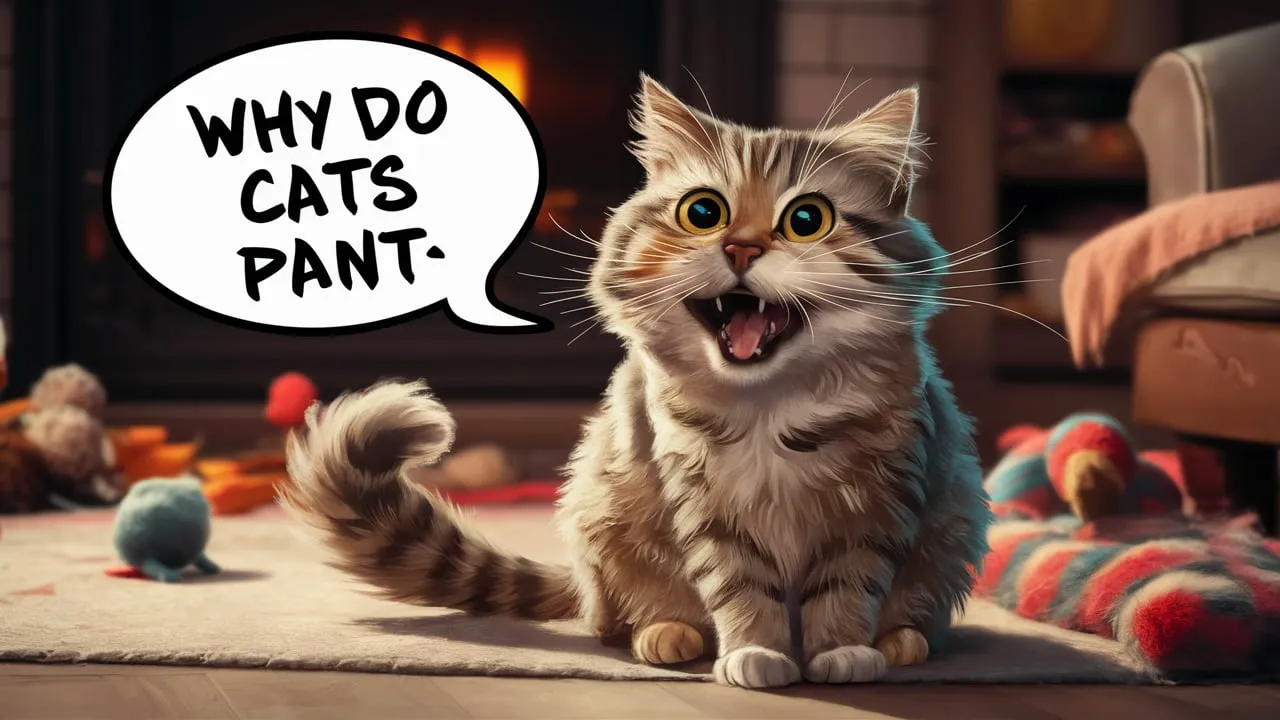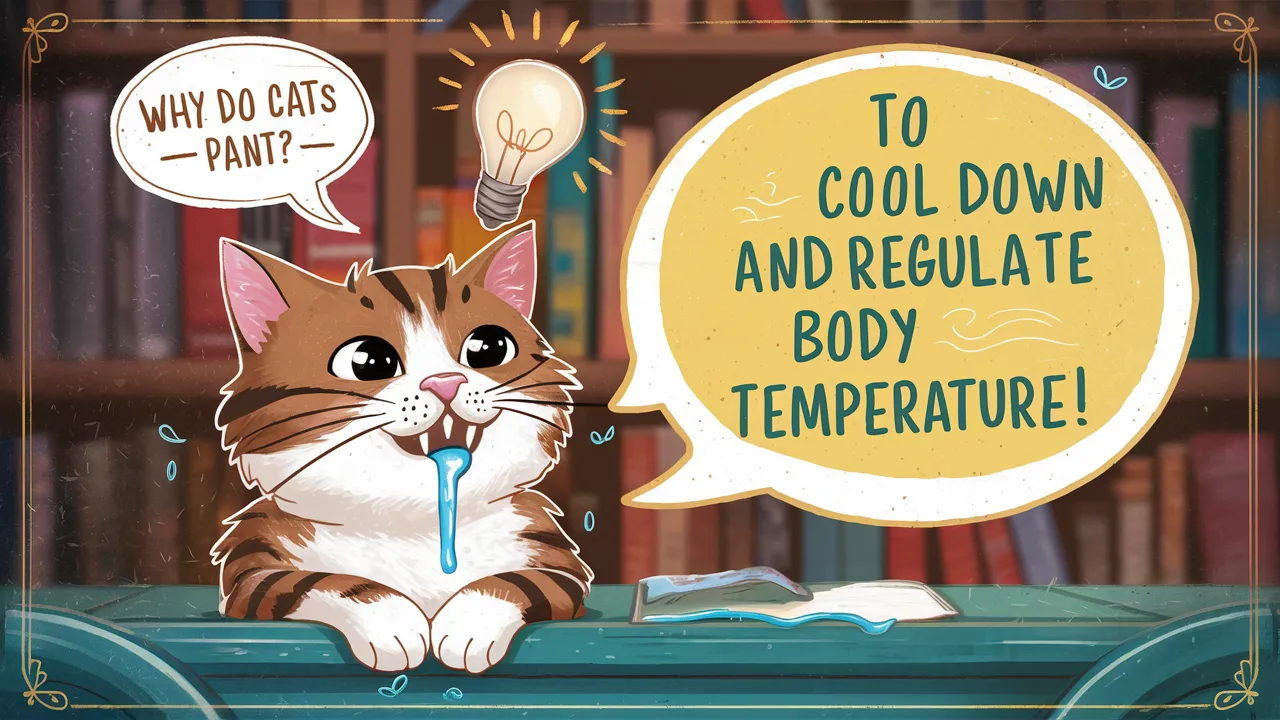Why Do Cats Pant? Cats are known for their quiet and composed nature, often exuding an air of serenity. However, there are times when their usual calm demeanor is disrupted by a noticeable change in their breathing patterns, particularly panting.
Infor Cats will delve into the reasons why cats pant, exploring the various causes in this article!
Normal Panting in Cats
While panting is not as common in cats as it is in dogs, it can occur under certain circumstances. Here are some instances where panting is considered normal in cats:
Exercise and Play
Cats, despite their reputation for being lazy, can get quite energetic during play sessions. After a vigorous bout of chasing toys, jumping, or climbing, a cat might pant as a natural response to increased physical exertion. This is similar to humans feeling out of breath after a workout.
Heat and Warm Weather
Cats are highly sensitive to heat and can overheat easily. Panting is their primary mechanism for regulating body temperature in hot conditions. If your cat is panting excessively, especially in warm weather, ensure they have access to cool water and shade. You can also help them cool down by providing a fan or a cool, damp towel.
Stress and Anxiety
Just like humans, cats can experience stress and excitement, which can lead to increased heart rate and panting. This is often seen during playtime, when they are introduced to new environments, or when they encounter unfamiliar people or animals. If you notice your cat panting due to stress, try to create a calm and reassuring environment for them.

When Panting Is a Sign of Trouble?
While normal panting in cats is usually short-lived and resolves on its own, there are situations where panting could indicate a more serious underlying condition. Here are some red flags to watch out for:
Overheating
If your cat is panting excessively, especially in warm weather, and you’ve taken steps to cool them down but they don’t seem to improve, it could be a sign of heat stroke. Heat stroke is a medical emergency that can be fatal if not treated promptly. Other symptoms of heat stroke include lethargy, vomiting, diarrhea, and seizures.
Pain and Injury
Pain, especially in the chest or abdomen, can trigger panting in cats. If your cat is panting and you suspect they might be in pain, it’s important to seek veterinary attention immediately. Other signs of pain include restlessness, vocalization, and reluctance to move.
Respiratory Problems
Respiratory infections, pneumonia, feline asthma, and other respiratory issues can cause difficulty breathing and panting. If your cat is panting and you notice other symptoms such as coughing, sneezing, or nasal discharge, it’s important to consult your veterinarian.
Heart Conditions
Heart conditions, such as cardiomyopathy or heart valve problems, can lead to fluid buildup in the lungs, causing difficulty breathing and panting. If your cat is panting and you notice other symptoms such as lethargy, coughing, or weight loss, it’s important to seek veterinary attention.
Toxicity
Certain toxins, such as pesticides, medications, and household cleaners, can cause respiratory distress and panting in cats. If you suspect your cat has been exposed to a toxin, it’s crucial to contact your veterinarian or the ASPCA Animal Poison Control Center immediately.
Identifying the Cause of Panting
If you notice your cat panting, it’s important to determine whether it’s a normal behavior or a sign of something more serious. Here’s a step-by-step approach to identifying the cause:
Observing Your Cat’s Behavior
- Context: Pay attention to the situation surrounding the panting. Is your cat panting after exercise, in hot weather, or during a stressful situation?
- Intensity and Duration: How intense is the panting? Is it a light, rapid panting, or is it labored and heavy? How long has it been going on?
- Overall Appearance: Does your cat seem otherwise healthy and alert, or are they lethargic, weak, or showing other signs of distress?
Checking for Other Symptoms
- Coughing or Sneezing: These could indicate a respiratory infection.
- Vomiting or Diarrhea: These could be signs of poisoning or a gastrointestinal issue.
- Lethargy or Weakness: These could be signs of pain, illness, or dehydration.
- Loss of Appetite: This could be a sign of illness or pain.
- Changes in Urination or Defecation: These could be signs of a urinary tract infection or other health issues.
Consulting Your Veterinarian
If you suspect that your cat’s panting is not normal or if it’s accompanied by other symptoms, it’s crucial to consult your veterinarian. They will perform a thorough physical examination.
It is including listening to your cat’s heart and lungs, and may recommend additional tests, such as blood work, x-rays, or an electrocardiogram (ECG) to determine the underlying cause of the panting.

How to Help Your Panting Cat?
If your cat is panting, there are several things you can do to help them feel more comfortable and potentially address the underlying cause.
Providing Cool Water and Shade
- Fresh Water: Ensure your cat has access to fresh, cool water at all times.
- Cool Environment: If it’s hot, provide your cat with a cool, shaded spot to rest. You can also use a fan to circulate cool air.
- Damp Towel: A cool, damp towel placed on your cat’s body can help them cool down.
Reducing Stress and Anxiety
- Calm Environment: Create a calm and relaxing environment for your cat. Avoid loud noises, sudden movements, and stressful situations.
- Safe Space: Provide your cat with a safe and comfortable space where they can retreat and feel secure.
- Playtime: Engage your cat in interactive play sessions to help them burn off excess energy and reduce stress.
Seeking Veterinary Care
If your cat’s panting is excessive, persistent, or accompanied by other symptoms, it’s crucial to seek veterinary care. Your veterinarian can diagnose the underlying cause of the panting and recommend appropriate treatment.
Conclusion
Panting in cats can be a normal response to certain situations, but it can also be a sign of a serious medical condition. By understanding the reasons why cats pant and recognizing the signs of abnormal panting, you can provide your feline friend with the best possible care.
Remember, a happy and healthy cat is a relaxed and comfortable cat. By providing a cool environment, reducing stress, and seeking veterinary attention when necessary, you can help keep your cat cool, calm, and comfortable.

Related Post
Potential Causes Of Cat Pooping Jelly Like Substance With Blood
Is Laryngitis In Cats Deadly? Understanding Feline Vocal Cord Inflammation
What Is Shaken Cat Syndrome?